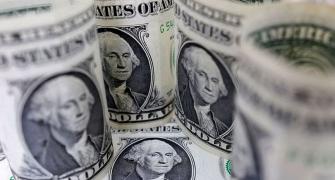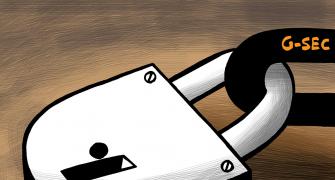I concluded the last column arguing that countries with unserviceable debts have solved the problem in one of three ways -- outright default, hyper-inflation, or restructuring of debt. In the case of the US's external debt, outright default being unthinkable, is there a possibility of the other two avenues being taken?
And how would this affect the major holders of dollar securities, most of whom happen to be developing countries in Asia, and oil exporters?
In theory at least, hyper-inflation is possible, resulting from the huge monetary and fiscal excesses in the US and other western countries. The prospects would be heightened if the economic recovery is fast.
To be sure, one is not referring to three-digit levels, but an average of near-two-digit inflation, which the US experienced in the 1970s. Given the current extremely low bond yields in the US, an inflation rate of 8-9 per cent per annum persisting for a few years would significantly reduce the "real" value of the outstanding debt.
As for restructuring, this would involve converting a portion of the US debt (present? future?) into say SDRs, the reserve asset preferred by the Chinese. There are several issues in relation to replacement of the dollar by the SDR as the principal reserve currency:
- Will SDR be acceptable to many, given that it is not backed by any government? One question mark in terms of the euro replacing the dollar on a significant scale is that it is not backed by a single government;
- Turning to the three characteristics of money, SDR does quality under two of them: It is a unit of account and a store for value, but not the third, namely a medium of exchange;
- The dollar itself does not satisfy all the three criteria: it is a unit of account and the medium of exchange, but not a store for value. Entirely apart from where it will go from the current levels, in the post-war era, the currency has dropped by two thirds against the Japanese yen and the euro/Deutsche mark.
- In any case, it seems difficult to imagine that the SDR would replace the dollar as a reserve currency until it becomes accepted as a medium of exchange -- in other words, unless global trade, at least in commodities, starts getting priced in the SDR. Today, countries like Iran are demanding payment for oil, the largest traded commodity in the world, in the euro; however, the basic pricing is still in dollars and the euro is merely the currency of payment.
A related major issue in global finance is the huge trade imbalances -- in particular, China's surplus and the US deficit. This brings us to the question of the bilateral exchange rate between the yuan and the dollar. After allowing the currency to appreciate by about 21 per cent, the Chinese have recently re-pegged it.
They also believe that the bilateral imbalance is not merely a question of the exchange rate, but equally of the cultural values and habits. The Asians in general, and the Chinese in particular, are huge savers, perhaps also because of a lack of adequate social security in most of the countries.
In contrast, the US is seen as a spendthrift, consumer society, whose culture militates against savings. Given this, the savings/investment (and hence trade) imbalance may continue, irrespective of the exchange rate.
It is also questionable whether developing countries would be able to continue to grow fast purely on domestic demand and, if so, how long will it take for, say, China to make the transition. As Michael Pettis, a Professor of finance at Peking University, argued in a recent article (Financial Times, April 2), it took "two decades of tough economic conditions for the US to manage its own transition from export-led growth to domestic consumption-led growth in the early 19th century".
How long will China take without exposing itself to social strife?
The exchange rate issue is further exacerbated by lack of a clear policy in the US.
Its authorities keep claiming that the US has a strong dollar policy, even as it continues to put pressure on China to revalue its currency -- which, of course, means a weaker dollar in yuan terms.
It knows that a weaker dollar may be better for exports and jobs, but simultaneously needs a stable/strong dollar externally in order to attract foreign investors to buy treasury securities. As it is, 50 per cent of US treasuries are held by non-residents, including foreign central banks, and the proportion would surely go up given the huge fiscal deficit. One thing is sure: if China loses faith in the dollar, the currency will collapse.
Meanwhile, there are some positive signs. In recent months, the US trade deficit has narrowed sharply primarily because lower imports.
And, China's reserves have hardly grown in the first quarter of 2009, partly because it is stockpiling commodities including gold, and investing abroad in resource rich countries in Latin America and Africa, and in Australia.








